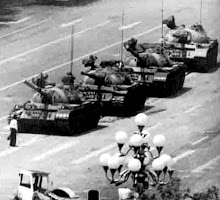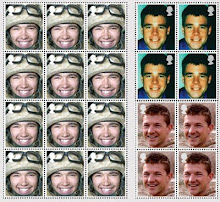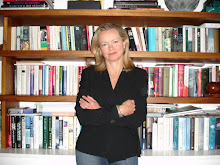
Members of the LST & Landing Craft Association gathered recently to celebrate the life of their shipmate Fred Jackson ISO, QFSM, CPM
Anniversaries are like buses at the moment. Tiananmen Square plus 20 and this weekend's 65th Anniversary of the D-Day Landings - both of which have caused very different but predictable amounts of furore (viz: my previous post). I am no royalist but I believe it is important that Prince Charles is now going to the Normandy commemorations. It is a key anniversary - mainly because the numbers of veterans are dwindling and this may be the last year that many of them, all now in their 80s and 90s, are well enough to cross the Channel.
Sadly, it is six months too late for my own Father to join them. He died, after a few rather less than dignified months of dementia, in December 2008. We celebrated his life last month with 14 of his LCT and LSA shipmates, who included National Standard Bearer Anne Cutter and her husband Harry, Parade Marshall. They solemnly placed the huge banner on the altar in church, behind the casket containing his ashes upon which his white fireman's helmet was placed. When they retrieved it and marched out to the Sharlston Male Voice Choir singing the Navy Hymn (For those in peril on the sea) there was not a dry eye in church.
There has already been reams of D-Day material in the MSM; one of the most moving and thoughtful pieces was by James Delingpole in the Telegraph. James interviewed surviving members of 47 Royal Marine Commando and visited the scene of their most heroic battle at Port-en-Bessin. Read it here.
I will now hand over to Dad himself, who wrote about his own D-Day experiences in an uncompleted memoir. The BBC also has some wonderful audio clips of veterans while the British Legion is also doing its usual sterling job.
Dad returned from Normandy the week after D-Day, celebrating his 21st birthday, not as I did with champagne and canapes under a Palladian collonade, but on the choppy waters of the Channel, not knowing whether he would ever set foot on British shores again. I think you get a wonderful feel for his optimistic, courageous and ever curious outlook on life from these - completely unedited by me - few lines.

Holding Juno - German counter-attacks
"At about this time, we changed over our old Mark III Landing Craft for a newer Mark IV type with far better accomodation - causing a near mutiny from the other crews. We were then allocated a detachment of Canadians and nine large tanks each with a huge 105mm gun. Our job on the approach to Juno was to open fire at 10,000 yards, run on to the beach, offload via the bow ramp, prior to kedging off (pulling yourself off the beach by use of the storm anchor) and heading for another load.
"We started doing many familiarisation exercises on the beaches at Boscombe, Bournemouth and Slapton beaches which were similar to the ones we would land on in France. Around this time, Slapton beach saw a shoot-up with German E Boats and almost a thousand men - all US personnel - were lost. Between March and April, we had a quickie refit and check at the Lady Bee boatyard in Southwick, where they normally built luxury yachts. We managed to persuade them to build us a lovely day cabin in our troop space - quite unofficially of course!
"Returning to Southampton and yet more exercises, we had a pep talk from Lord Louis Mountbatten himself on the 1st of June, telling us what to expect and how to react - a bit like Horatio at Trafalgar. On the 4th of June, we received orders to stand by to sail but a serious gale had blown up and the operation had to be delayed by 24 hours. June 6th would be D-Day. We sailed on the night of the 5th. The 100 miles across to France took us 12 hours. En route we received a message to the effect that we would be required for the second wave on D+1. We made our way to Juno beach but were not required to fire on the way in. There was still a huge amount of activity on the beach, but our lads already appeared to have the upper hand.
"We looked for an opening on the beach and the skipper slowly brought her in. When I felt the craft grounding, I took a sounding and found only three foot of water, so I gave the order for the first tank to move off. We successfully disembarked all nine tanks and they rumbled across to join the others on the beach. There was some air action going on at the time and many of our men on the ground opening up at a lone Spitfire which came across the scene. Fortunately, they appeared to miss him however and he made good his escape on this occasion to fight another day.
"We then started taking in the stern kedge anchor which was a little tricky as we were semi-impaled on a beach defence but managed it successfully, finally got turned around and headed back towards UK and our loading base in Gosport. A couple of miles offshore, we came across a sister ship with wires around her propellors. We took them in tow for a couple of hours and they eventually managed to clear them. Some 12 hours later we were on G4 Loading Hard in Gosport and after a few welcome drinks whilst loading, we were soon ramp up, heading back to Arromanches. Luckily, the local, the Lord Nelson, was just off the Hard. In the many days that followed, we did some 50 trips with men, transport, tanks and later, agricultural machinery for the farmers in Rouen."
Find out more about the British Legion's D-DAY 65 campaign & how they are using it to help current servicemen in the theatres of Iraq & Afghanistan here.




